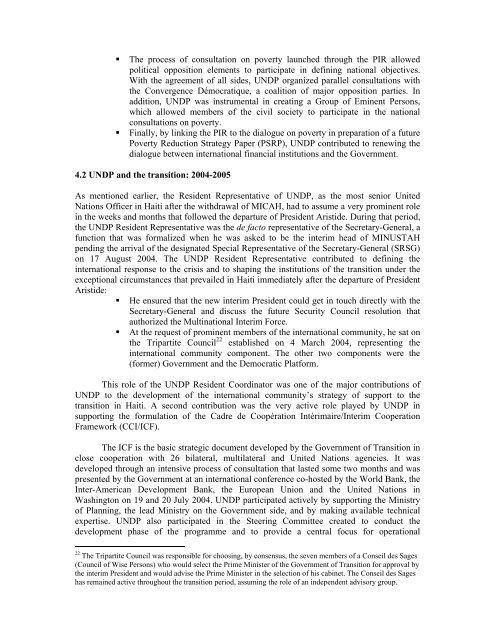case study Haiti - United Nations Development Programme
case study Haiti - United Nations Development Programme
case study Haiti - United Nations Development Programme
Create successful ePaper yourself
Turn your PDF publications into a flip-book with our unique Google optimized e-Paper software.
• The process of consultation on poverty launched through the PIR allowed<br />
political opposition elements to participate in defining national objectives.<br />
With the agreement of all sides, UNDP organized parallel consultations with<br />
the Convergence Démocratique, a coalition of major opposition parties. In<br />
addition, UNDP was instrumental in creating a Group of Eminent Persons,<br />
which allowed members of the civil society to participate in the national<br />
consultations on poverty.<br />
• Finally, by linking the PIR to the dialogue on poverty in preparation of a future<br />
Poverty Reduction Strategy Paper (PSRP), UNDP contributed to renewing the<br />
dialogue between international financial institutions and the Government.<br />
4.2 UNDP and the transition: 2004-2005<br />
As mentioned earlier, the Resident Representative of UNDP, as the most senior <strong>United</strong><br />
<strong>Nations</strong> Officer in <strong>Haiti</strong> after the withdrawal of MICAH, had to assume a very prominent role<br />
in the weeks and months that followed the departure of President Aristide. During that period,<br />
the UNDP Resident Representative was the de facto representative of the Secretary-General, a<br />
function that was formalized when he was asked to be the interim head of MINUSTAH<br />
pending the arrival of the designated Special Representative of the Secretary-General (SRSG)<br />
on 17 August 2004. The UNDP Resident Representative contributed to defining the<br />
international response to the crisis and to shaping the institutions of the transition under the<br />
exceptional circumstances that prevailed in <strong>Haiti</strong> immediately after the departure of President<br />
Aristide:<br />
• He ensured that the new interim President could get in touch directly with the<br />
Secretary-General and discuss the future Security Council resolution that<br />
authorized the Multinational Interim Force.<br />
• At the request of prominent members of the international community, he sat on<br />
the Tripartite Council 22 established on 4 March 2004, representing the<br />
international community component. The other two components were the<br />
(former) Government and the Democratic Platform.<br />
This role of the UNDP Resident Coordinator was one of the major contributions of<br />
UNDP to the development of the international community’s strategy of support to the<br />
transition in <strong>Haiti</strong>. A second contribution was the very active role played by UNDP in<br />
supporting the formulation of the Cadre de Coopération Intérimaire/Interim Cooperation<br />
Framework (CCI/ICF).<br />
The ICF is the basic strategic document developed by the Government of Transition in<br />
close cooperation with 26 bilateral, multilateral and <strong>United</strong> <strong>Nations</strong> agencies. It was<br />
developed through an intensive process of consultation that lasted some two months and was<br />
presented by the Government at an international conference co-hosted by the World Bank, the<br />
Inter-American <strong>Development</strong> Bank, the European Union and the <strong>United</strong> <strong>Nations</strong> in<br />
Washington on 19 and 20 July 2004. UNDP participated actively by supporting the Ministry<br />
of Planning, the lead Ministry on the Government side, and by making available technical<br />
expertise. UNDP also participated in the Steering Committee created to conduct the<br />
development phase of the programme and to provide a central focus for operational<br />
22 The Tripartite Council was responsible for choosing, by consensus, the seven members of a Conseil des Sages<br />
(Council of Wise Persons) who would select the Prime Minister of the Government of Transition for approval by<br />
the interim President and would advise the Prime Minister in the selection of his cabinet. The Conseil des Sages<br />
has remained active throughout the transition period, assuming the role of an independent advisory group.

















